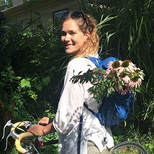Every Milkweed Counts.Teachers and educators can sign up here to receive their free seed packets and join Save Our Monarch's Pollinator Garden Program. You don't need a lot of space to start a pollinator garden and just a few containers or raised beds can provide a habitat for hungry butterflies and bees. Having this outdoor classroom can encourage observation, exploration and a instill land stewardship values. Teachers can also build a curriculum around the garden, focusing on subjects such as: biology, environmental studies, writing, and art. Save Our Monarch's Pollinator Garden Program encourages every school, scout troop and 4H club to participate. Once enrolled, schools will receive three 3 free Milkweed seed packets and one a pollinator mix, containing 25 wildflower varieties. Our goal is to plant over 1,000 Pollinator gardens across the US this year. Getting StartedFirst you may need to establish a committee, club, or talk with students to see who is interested in caring for the garden. If there is already a Garden Club in place, then you are halfway there! Consider starting a Roots and Shoots Club which has a large community and thousands of free resources for teachers and educators. If you don't already have a garden site established at your school or community space, have the students scope out a good location for the garden. The garden will need to receive at least 6 hours of direct sunlight and have easy access to water. Remember that raised beds and container-gardening are great options as well. Do your researchResearch pollinator species native to your region and find out what they need to thrive and reproduce. Then, you can call or visit local nurseries in your area to find these plants and discover what soil types they prefer. It is also important to choose plants that bloom at different times so that you will have year-long food source for pollinator species. Choose seeds or small plantsSmall plants that have already started growing in a nursery are simple and have a much higher rate of success. However, seed-starting is also a great activity for students that can begin as early as January. Seed-starting is best if you plan ahead and start early. Seed-starting can also be a good option if you are creating a very large garden as they tend to cost less. Also, look for free seeds and donations! Plant NativeUse as many plants native to your region as possible. Native plants have evolved closely with native species and will be able to provide them with food shelter. In fact, some pollinator species are entirely dependent on the availability of certain native plants. In general, the more variety the better! You want to attract as many different types of pollinators as you can. When in doubt, call your local plant nursery or extension office and ask what they recommend. Plants that are a variety of shapes, sizes and colors will accommodate the most variety of pollinators. Build a CurriculumScience/Biology – Study the life cycles, reproductive cycles, and anatomy of pollinators. Take the students outside and observe them in their natural habitat. Another fun activity is rearing Monarchs in the classroom and later releasing them in your garden. English – Challenge students to write poetry and engage in creative writing while they sit and observe their favorite butterfly or plant. History/Social Studies – Discuss how the environment has changed over the years and how this can relate to different pollinator species. Art- The possibilities are endless for art projects related to the garden and pollinators! You can encourage students to make signs for the garden or paint raised beds to build pride around their garden. Get creative with different art media such as clay, paper, rock, colored pencils and so forth! Plant, Water and Wait!Once you have found your garden group, done your research and acquired your plants or seeds, it's time to plant! Remember that gardens require regular maintenance so it is important to establish specific times ,such as at the beginning of class, to visit the garden. Then just wait for the bees and butterflies to start filling your garden. Free Garden Resources
1 Comment
|
AuthorRebecca Chandler Archives
March 2024
Categories |



 RSS Feed
RSS Feed